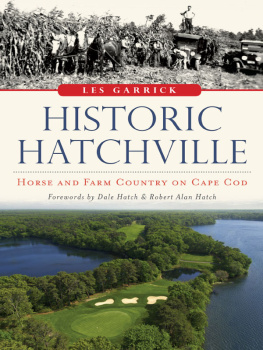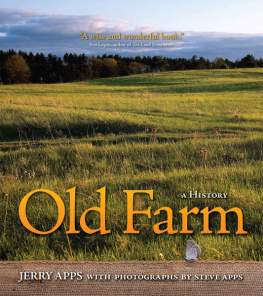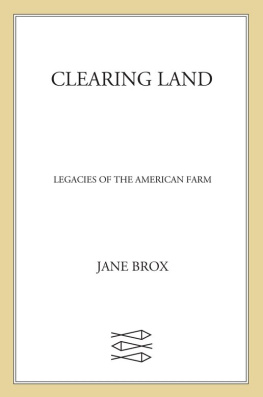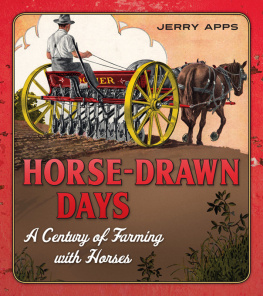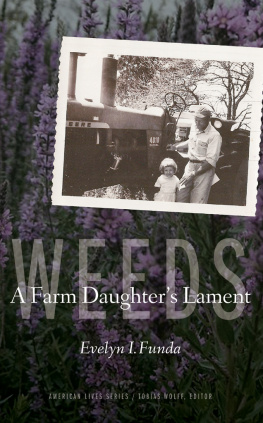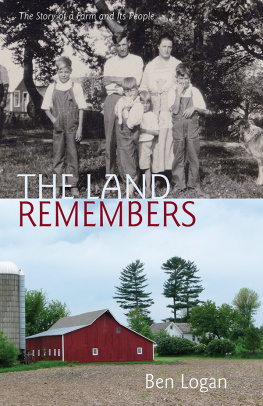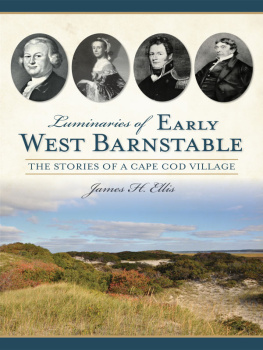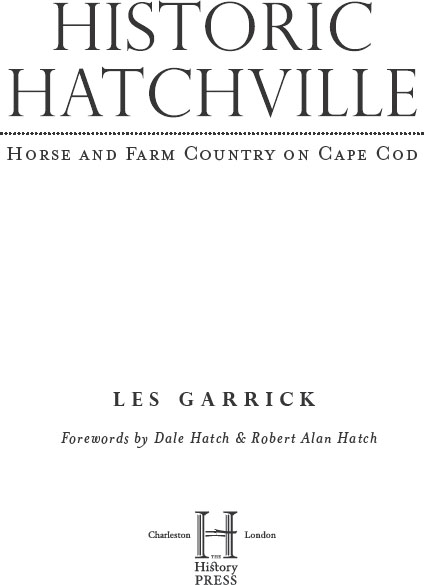
Published by The History Press
Charleston, SC 29403
www.historypress.net
Copyright 2014 by Les Garrick
All rights reserved
Front cover, bottom: Ninth hole at Cape Cod Country Club. Courtesy of Friel Golf Management.
First published 2014
e-book edition 2014
ISBN 978.1.62585.044.7
Library of Congress CIP data applied for.
print edition ISBN 978.1.62619.511.0
Notice: The information in this book is true and complete to the best of our knowledge. It is offered without guarantee on the part of the author or The History Press. The author and The History Press disclaim all liability in connection with the use of this book.
All rights reserved. No part of this book may be reproduced or transmitted in any form whatsoever without prior written permission from the publisher except in the case of brief quotations embodied in critical articles and reviews.

Eight Villages of Falmouth, Massachusetts. Courtesy Falmouth Geographic Information System (GIS).
CONTENTS
FOREWORD
The Hatch family owes much to Les Garrick for researching and writing Historic Hatchville: Horse and Farm Country on Cape Cod. It is the area where our Hatch ancestors settled after immigrating to escape the tyrannical monarch Charles I of England for religious freedom and liberty. It has been very interesting to read about the unique history of Hatchville and how it developed over many years through the words of Mr. Garrick.
Had I realized while attending history classes growing up that my Hatch ancestors were a part of American history, the classes in school and college would have had more meaning. I just did not get the connection until researching and writing the first of my three books published on the Hatch family. Our ancestors were early pioneers of the Puritan colonies in Massachusetts as early as 1634 or 1635 and, therefore, were among the early founders of this great nation of America.
Four generations of my direct Hatch line lived in the Falmouth/Barnstable area for almost one hundred years before moving on to Tolland, Connecticut. My eighth-great-grandparents Jonathan Hatch and Sarah Rowley were married on April 11, 1646, in Barnstable by Reverend John Lothrop (15841653). He was an English Anglican clergyman who became a Congregationalist minister. As a result of preaching his Puritan reform beliefs, Reverend Lothrop and members of his congregation were thrown into prison for two years. They had the options of denouncing their beliefs, being executed or moving to the New World. They chose to immigrate to New England. Lothrop founded Barnstable, Massachusetts, in 1639.
The Hatches were very religious people. In writing his last will and testament, dated September 15, 1705, Jonathan Hatch expressed some of his religious feelings and beliefs, stating he believed in God, life on Earth was transitory and there was life after death. It was his desire to live with God, whom he acknowledged as our creator. He believed in the resurrection of the dead through Jesus Christ, and he recognized and expressed gratitude to God as the source of his earthly possessions and property. Jonathan Hatch was honored and respected by the community where he had lived for the last fifty years of his life. He died at the age of eighty-five in Falmouth, Massachusetts, and is buried in the Falmouth Old Burying Ground.
One unusual and interesting story by Clarence J. Anderson (19122004) of Falmouth reads as follows:
Barnabas Hatch was born in Falmouth 8 December 1751. It is said that he married a near relative, which accounted for seven out of nine children being so small. They were less than four feet in height and four of them were so low of stature as to stand under a common door latch, but they lived to be quite aged and well educated and much respected. They were called the The Little Hatches of Falmouth.
Ancestors of todays Hatch family were very patriotic and lovers of freedom and liberty. In my research, ninety-one Hatch soldiers were in the American Revolutionary War, including my direct ancestors Nathaniel Hatch and his son Captain Jeremiah Hatch. After his father died in the war, Jeremiah joined up as a youth and was a fifer. Eleven of my direct fourth-, fifth- or sixth-great-grandfathers served as soldiers under General George Washington.
Three different Hatch lines (Captain Jeremiah Hatch, Ira Stearns Hatch and Jacob Hatch) joined the Church of Jesus Christ of Latter-Day Saints (Mormons) in the 1830s. Three generations of my ancestors in Addison County, Vermont, joined this church and moved to Nauvoo, Illinois, and then westward with the Mormon pioneers. This is why there are so many Hatches living in Utah, Idaho and Arizona today.
Jeremiah Hatch (18231903) spearheaded the formation of the Hatch Genealogical Society of Salt Lake City, Utah, in the 1890s. The research of this organization resulted in the publication of two volumes of a book entitled Genealogy & History of the Hatch Family: Descendants of Thomas & Grace Hatch of Dorchester, Yarmouth, & Barnstable, Massachusetts published from 1925 to 1930.
My genealogy, down to my great-grandfather, is as follows: Thomas, Jonathan, Benjamin, John, Nathaniel, Captain Jeremiah, Hezekiah, Jeremiah and Alvah Alexander Hatch.
Again, thanks to Les Garrick for writing this book and preserving the history of this historic area of Cape Cod.
Dale Hatch
FOREWORD
The same year I joined the Department of History at the University of Florida as a young assistant professor, Les Garrick and his colleagues were publishing important studies on the social behavior of that rowdy reptile known as the Florida gator. Coming from Wisconsin and the land of Bucky Badger, it took me a while to appreciate the scaly creatures that occasionally blocked traffic at the edge of campus. Those studies, I learned through my work with the Florida Audubon Society and the Sierra Club, helped conservation biologists understand the social structure of still-wild populationsin other words, which gators not to harvest for skins and steaks. Careful researchin science or historyhelps inform our decisions.
Now retired from the University of Florida, I can devote more time to my Hatch heritage. And it is with great interest that I learned that Les was writing a book about the Hatches in Hatchville, a village of Falmouth, Massachusetts, on Cape Cod. Thomas Hatch, who arrived at Situate, Massachusetts, in 1638, is my oldest American ancestor. As it happens, two of the earliest Hatch settlers in colonial America were named Thomas Hatch. Here I confess that my Thomas did not go to Yarmouth and Barnstable, as did the other Thomas, from whose ancestors name the name Hatchville derived. Instead, after several generations, part of my Thomass lineage left Scituate for Attleboro, which would eventually become famous for jewelry and manufacturingnot the Native Americans farmed wilderness.
Within three generations, change came to Attleboro. While life in Scituate involved farming and living off the ocean, Attleboro prompted occupational shifts from farming to trade, metalworking and commerce. Across some six generations in Massachusetts, these Hatch ancestors participated in the French and Indian War and the American Revolution, notably several tours of duty by Nathan Hatch, whose story ties together the westward movement of the family across four generationsfrom Massachusetts to Vermont, New York and Wisconsin. Nathans brother became a family legend. Israel Hatch owned a number of taverns, some associated with his stagecoach line that linked Providence and Boston. His first effort was building the Hatch Tavern in Attleboro. Large and stately, it was a travel hub that drew such notable figures as George Washington and Thomas Jefferson. Although he served only briefly in the Revolution, Israel also owned establishments in Boston, including the White Horse Tavern, that were frequented by colonial activists and Free Masons. Israel also filed one of the first U.S. patents, one of them for a monorail train.
Next page
